“In order to solve the world’s problems, we must continue to have serious debates,” a CNN correspondent says emphatically during a glitzy promotional spot, aired endlessly on the network. But when it comes to Israel’s wars, CNN has also proven that its correspondents and editors reserve the right to reduce or withhold serious discussion and questions of accountability from the interviews it broadcasts.
This was particularly clear during the latest violence in Gaza, when, on the last day of fighting, CNN lead anchor Wolf Blitzer sat down with Israeli President Shimon Peres. At the time, over 150 Palestinians were known to be dead and entire blocks flattened after eight days during which Israeli jet fighters, land-based artillery, and battleships shelled the densely populated strip.
“You’re close to ninety years old,” Blitzer told Peres in the quiet calm of his presidential office. “It’s hard to believe you look so great. How do you feel?”
“I feel that I’m too young for the job,” Peres replied coyly.
But Blitzer persisted. This was not just a one-off nicety. Despite the bloodshed, CNN’s lead anchor wanted to take the charm exchange to the next level: did the eighty-nine-year-old plan on running for prime minister?
“Don’t you think I’m too young for the job?” responded Peres again, smiling.
Unsatisfied, Blitzer, formerly employed as editor of the Israel lobby’s monthly publication Near East Report, repeated: “I think you look great.”
“Is there one piece of advice for our viewers who are watching right now that you want to share on how you’ve managed to stay so youthful, so energetic, so alert all these years?
Blitzer got the opening he had hoped for. Finally Peres spoke at length about the virtues of dieting, self-restraint, generosity, optimism, and even love.
“The best vacation is to work, to be engaged, to be curious, to care, to love people,” Peres concluded, after several minutes of musing.
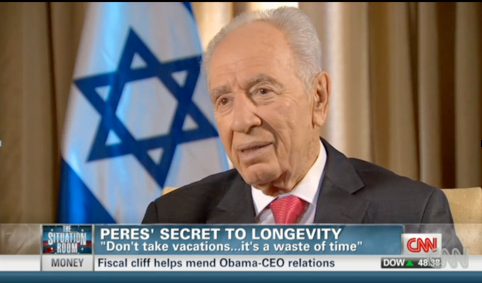
[Screen shot from CNN.]
Thanking the president, Blitzer ended the segment by raising his chorus of praise one last notch, transforming the career politician and former military leader into a veritable cuddly grandfather. Once back in the studio, Blitzer reflected: “Hard to believe he’s eighty-nine years old, almost ninety. He’s amazing, amazing indeed.”
Other questions preceded this portion of the interview. Almost all of them focused on the behavior of Israel’s neighbors and potential threats to the Jewish state. Blitzer asked: Would Hamas be able to control Gaza and comply with the ceasefire? If not, whom should Israel negotiate with?
Was Peres worried about Hezbollah in Lebanon or Assad in Syria? Could the Syrian president lose control of his chemical weapons? Peres was not sure.
What about the role of Iran? Was Egypt playing a productive role? What about the United States? Was it doing enough to help Israel?
Only once during this detailed inventory of Israel’s concerns about the behavior of other nations did Blitzer come close to asking Peres about the devastating destruction his country’s military wrought. Of course the question was not framed in terms of responsibility or accountability. Rather, Blitzer asked: “what’s happening” in Gaza, divorced entirely of a direct Israeli military role.
Blitzer asked in a flat voice: “When you see what’s happening in Gaza, the pictures of innocent civilians who have been killed, and children, families. What goes through your mind?”
Peres seized the opportunity to blame Hamas. Blitzer accepted the brevity and quickly moved on to the real issue at stake, the threats Israel faced: rockets to the north and the Palestinian Authority’s call for statehood, upon which Blitzer pondered: “Is that something acceptable to Israel?”
The dangers Israel faced dominated Blitzer’s journalistic curiosity, or lack thereof. Nearly all his questions were posed with empathy toward the Jewish state’s struggles; no questioning, in fact no mention, of its own aggressive actions or their motivations. Viewers were squarely put in Israel’s shoes.
Contrast this to an interview conducted the same day between CNN chief international correspondent Christiane Amanpour and Hamas political chief Khaled Meshaal.
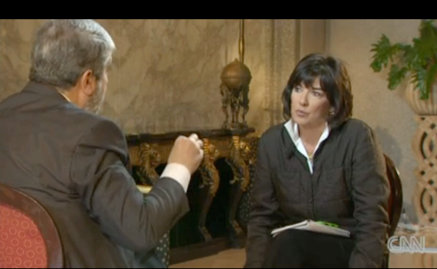
[Screen shot from CNN.]
In terms of challenges and threats, the people of Gaza obviously faced a myriad of them after eight days of punishing bombardments, and decades of crippling economic blockade and various restrictions imposed by Israel.
But rather than ask about Gazan concerns as Blitzer had done with Israel’s leader, Amanpour lunged at Meshaal from the outset. She fired a triple barrage of indictments: “Is it useful to kill civilians? Is that useful to you? Is it useful to create terror on civilians inside Israel?
Unlike Blitzer who only tepidly posed a question about violence, Amanpour seemed to be putting Hamas on trial for war crimes. And while Blitzer accepted Peres’ evasive response without question, Amanpour barely listened to Meshaal’s answer, though it nearly mirrored that of Peres in denouncing civilian death and blaming the enemy.
Hamas was responding to Israel’s assassination of one its leaders, Meshaal explained, adding: “I don’t like to shed any drop of blood.”
But Amanpour continued as if the question had gone unanswered: “Do you think its a legitimate part of what you call resistance, to kill Israeli civilians inside Israel,” she repeated, this time pointing the earpiece of her eyeglasses at Meshaal for emphasis.
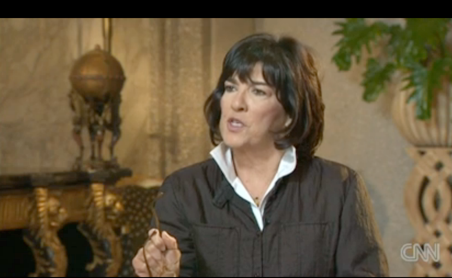
[Screen shot from CNN.]
Again, the Hamas leader tried to explain attacks as the only resistance available in an asymetrical battlefield. This time Amanpour interrupted Meshaal mid-sentence, adopting the Israeli argument of blaming Hamas for Israel’s airstrikes.
“When you make your analysis of how much pain you’re going to inflict,” she continued, squinting her eyes with incredulity. “Do you consider...how many Palestinian civilians are being killed because of your actions?”
Amanpour interrupted Mishaal nearly a dozen more times during the interview. At one point she accused him of “making up excuses.” Later she questioned his arguments as irrational when he demanded a return for Palestinian refugees.
“Under international agreements, every Palestinian living in the diaspora is not going to be able to come back to Israel,” she said confidently, throwing her hands in the air. But Amanpour offered no reference to said agreement, deeming it only vaguely as “the parameters.”
In fact, as Yousef Munayyer recently pointed out, many UN resolutions support the right of return for refugees, and Israel’s refusal to discuss the issue has been one of the main obstacles to resolving the conflict.
Thus, not only did Amanpour’s approach show little of the patience Peres was afforded, she also reserved the right to attack her subject with unspecific and unchecked arguments. Would Blitzer have ever questioned Peres on Jews’ “right to return” to Israel?
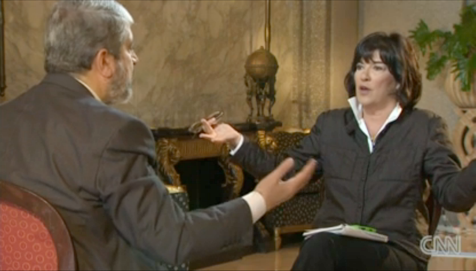
[Screen shot from CNN.]
As the interview continued, Amanpour hounded Meshaal on Hamas’s recent actions. Why did they move their headquarters away from Damascus? Were they in disagreement with Assad? Certainly they must have distanced themselves from Iran? And yet they were still getting Iranian missiles? Was Hamas involved in a Twitter war, and, “is that crazy?”
Much to the contrary of the Peres interview, the questions focused entirely on the actions of Hamas. There were no questions about the threats it has faced, even though Israel has so systematically assassinated so many of its ranks, including its founder and former leader.
Exasperated by his answers, Amanpour harped: “What is your goal? You govern Gaza. What is the goal, endless resistance, endless fighting, endless death?”
Clearly fond of the term, Amanpour evoked the phrase “endless fighting” or “endless death” five times to characterize Hamas, in questions that began to resemble rhetorical statements with no answers necessary.
Would Blitzer have dared ask Peres to justify Israel’s “endless” harassment, “endless” mass incarceration, “endless” occupation, and indeed “endless” war with Palestinians? In fact, Blitzer did not even interrupt Peres once during the interview, only silently nodding in agreement with his responses.
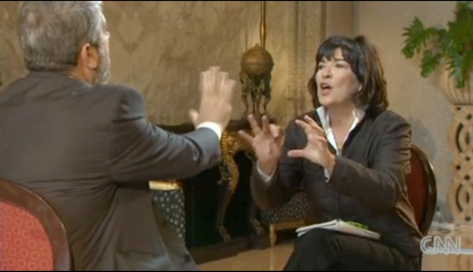
[Screen shot from CNN.]
Instead of pestering the Israeli leader for answers over his government’s decades-old collective punishment of Palestinians, Blitzer pushed him on the secrets of youth.
But the climax of dissonance between the two interviews came at the very end, when Amanpour wanted to make absolutely certain the Hamas leader was done with politics.
“You said you would no longer run to be President of Hamas. And yet you’re still here. Are you going to continue trying to be elected?”
Meshaal replied by saying he would not accept nomination and all Hamas leaders must be nominated.
Amanpour was not satisfied: “But you won’t accept?”
Again Meshaal repeated his answer, yet strangely Amanpour persisted:
“So just to be clear, after this term, no more Khaled Meshaal, leader of Hamas?
He replied a third time: “Yes. This is my clear standing.”
How different a tone than that struck by Blitzer who not only spoke adoringly about his subject, remarking on his “amazing” energy, but even urged him to stay in politics, by suggesting he run for prime minister. Amanpour, on the other hand, wanted to make one hundred percent sure she wouldn’t be interviewing Meshaal again. So seemingly relieved by the answer, she would not rest until she had heard it three times.
The antics of Blitzer and Amanpour, CNN’s two most senior faces, shows the clear favor of Peres over Meshaal. More importantly, the questions aimed at the two leaders reveals empathy toward Israel’s dangers and little mention of those facing Gazans. However, it is worth noting that the reporting of a few CNN journalists somewhat mitigated this clear bias.
Senior correspondents Arwa Damon, Ben Wedeman, and Sara Sidner spent extended periods of time with Palestinians, offering some of the few detailed reports on the hardships of daily life under round-the-clock Israeli air strikes.
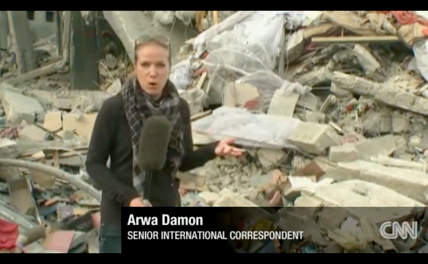
[Screen shot from CNN.]
These reports were often juxtaposed with the fears faced by Israelis, though they had a billion-dollar missile defense system, alert sirens, and readily available bomb shelters for protection, luxuries Palestinians in Gaza and the West Bank could not dream of.
By constantly juxtaposing the two sides, viewers may have assumed that Hamas and Israel were formidable enemies and their populations equally vulnerable to attacks. But there were no reports analyzing the asymmetrical power dynamics on the battlefield where the later, a hastily organized guerrilla group, relied on short range, largely ineffective rockets; while the former, the world’s fourth most powerful military, wields some of the deadliest weapons known to man.
Misleading as it may be, CNN seemed to completely abandon its “balanced” policy as it questioned the leaders of the two sides when the smoke had finally begun to clear.
[A version of this article was published on Mondoweiss.]